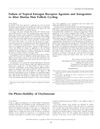 28 citations,
September 2017 in “Gynecological Endocrinology”
28 citations,
September 2017 in “Gynecological Endocrinology” Women with PCOS have higher levels of AMH in their blood and follicles, and this can help predict their risk of overreaction to fertility treatments.
[object Object]  July 2022 in “Research, Society and Development”
July 2022 in “Research, Society and Development” The conclusion is that different treatments improved hair growth in dogs with Alopecia X, but results varied and not all dogs had complete hair regrowth.
 4 citations,
February 2016 in “Clinical Pharmacology & Therapeutics”
4 citations,
February 2016 in “Clinical Pharmacology & Therapeutics” Hair follicle samples effectively show how well the drug MK-0752 targets and engages with the Notch pathway.
7 citations,
December 2015 in “PloS one” Cryopreserved mouse whisker follicles can grow hair when transplanted into nude mice.
 16 citations,
January 2016 in “Annals of Dermatology”
16 citations,
January 2016 in “Annals of Dermatology” Green tea component EGCG may help prevent hair loss by changing microRNA levels in certain scalp cells.
 May 2023 in “Brazilian Journal of Animal and Environmental Research”
May 2023 in “Brazilian Journal of Animal and Environmental Research” Photobiomodulation effectively treats hair loss in dogs with black hair follicular dysplasia.
 4 citations,
July 2015 in “Veterinary Dermatology”
4 citations,
July 2015 in “Veterinary Dermatology” Two types of 5α-reductase are in dog skin, which might make dutasteride better than finasteride for treating dog hair loss.
 20 citations,
January 2012 in “International journal of trichology”
20 citations,
January 2012 in “International journal of trichology” Steroids are the best treatment for Alopecia Areata with few side effects.
 9 citations,
February 2018 in “Forensic Science International”
9 citations,
February 2018 in “Forensic Science International” The study could not confirm if Victor Vinnetou was Mbuyisa Makhubu and suggested more evidence, like DNA tests, is needed.
 February 2024 in “Brazilian Journal of Implantology and Health Sciences”
February 2024 in “Brazilian Journal of Implantology and Health Sciences” PCOS often causes skin issues like excess hair, acne, and hair loss, needing early treatment.
 21 citations,
May 2005 in “Journal of the American Veterinary Medical Association”
21 citations,
May 2005 in “Journal of the American Veterinary Medical Association” The exact cause of growth hormone-responsive alopecia in dogs is unclear.
 100 citations,
April 2010 in “Expert Opinion on Pharmacotherapy”
100 citations,
April 2010 in “Expert Opinion on Pharmacotherapy” Hair loss in men treated best with early medication or transplant, new treatments researched.
 152 citations,
October 2010 in “Archives of Dermatology”
152 citations,
October 2010 in “Archives of Dermatology” Finasteride helps hair growth but may cause sexual side effects.
 17 citations,
December 2004 in “The Journal of Men's Health & Gender”
17 citations,
December 2004 in “The Journal of Men's Health & Gender” Male pattern baldness involves hormone-related hair thinning, shorter hair, and inflammation.
 29 citations,
July 2013 in “The Journal of Sexual Medicine”
29 citations,
July 2013 in “The Journal of Sexual Medicine” Testing for CAG repeat polymorphism in the androgen receptor gene is not currently recommended for managing hypogonadism.
 December 2011 in “Drug Research”
December 2011 in “Drug Research” The document shows the state of pharmaceutical patents as of 1999, focusing on treatments for various diseases.
November 2023 in “Bioengineering” AMT® is effective and safe for early-stage knee osteoarthritis.
[object Object]  14 citations,
September 2015 in “Expert Opinion on Therapeutic Targets”
14 citations,
September 2015 in “Expert Opinion on Therapeutic Targets” The conclusion is that while oral contraceptive pills are effective for PCOS-related high androgen levels, new treatments with fewer side effects are needed.
 2 citations,
August 2011 in “Revista Medica De Chile”
2 citations,
August 2011 in “Revista Medica De Chile” A postmenopausal woman's high testosterone levels and symptoms improved after removing a tumor from her ovary.
 18 citations,
December 2021 in “Foods”
18 citations,
December 2021 in “Foods” Seaweeds contain beneficial compounds with potential uses in food, cosmetics, and health, but more research is needed to improve extraction and safety.
665 citations,
April 2016 in “Nature communications” Blocking specific proteins can help remove aging cells and might treat age-related diseases and promote hair growth.
 November 2022 in “Research Square (Research Square)”
November 2022 in “Research Square (Research Square)” Keratin-associated proteins have ancient origins and were used for different purposes before being adapted for hair in mammals.
 November 2024 in “Skin Health and Disease”
November 2024 in “Skin Health and Disease” Minoxidil is effective for promoting hair growth and has various dermatological uses.
 28 citations,
May 2012 in “Veterinary Dermatology”
28 citations,
May 2012 in “Veterinary Dermatology” Different types of dog hair loss are linked to problems starting the hair growth phase and early hair cycle ending.
 2 citations,
June 2011 in “Journal of clinical and experimental investigations”
2 citations,
June 2011 in “Journal of clinical and experimental investigations” Oral zinc sulphate is an effective and safe treatment for thallium poisoning, especially for skin and hair symptoms.
29 citations,
March 2016 in “Dermatologic therapy” Platelet-rich plasma may successfully treat lichen planopillaris, as shown by one patient's symptom regression.
 35 citations,
March 2012 in “Experimental and Clinical Endocrinology & Diabetes”
35 citations,
March 2012 in “Experimental and Clinical Endocrinology & Diabetes” The conclusion is that accurately identifying the cause of high androgen levels in women with PCOS is crucial and requires specific tests.
 14 citations,
January 2015 in “ABCD”
14 citations,
January 2015 in “ABCD” The surgery effectively promoted and maintained weight loss in obese women during the first year.
4 citations,
October 2016 in “The journal of investigative dermatology/Journal of investigative dermatology” Using an anti-ICAM-1 antibody with rapamycin improves hair transplant survival in monkeys.
 6 citations,
January 1998 in “Journal of Investigative Dermatology”
6 citations,
January 1998 in “Journal of Investigative Dermatology” Estrogen receptors may not affect mouse hair growth as previously thought, and oxybenzone in sunscreen is stable in sunlight.
























